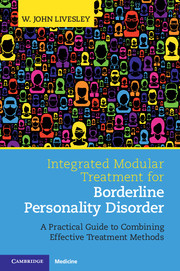 Integrated Modular Treatment for Borderline Personality Disorder
Integrated Modular Treatment for Borderline Personality Disorder Book contents
- Frontmatter
- Dedication
- Contents
- Preface
- Section 1 Introduction and Framework for Understanding Borderline Personality Disorder
- Section 2 Assessment and Treatment Planning
- Section 3 General Treatment Modules
- Section 4 Safety, Containment, and Engagement: The Initial Phase of Treatment
- Section 5 Improving Emotional Regulation and Modulation
- Section 6 Exploration and Change: Treating Interpersonal Problems
- Introduction
- 18 Principles for Treating Maladaptive Schemas and Interpersonal Patterns
- 19 Treating Submissiveness
- 20 Working with the Core Interpersonal Conflict
- Section 7 Constructing an Adaptive Sense of Self
- Section 8 Retrospect and Prospect
- References
- Index
18 - Principles for Treating Maladaptive Schemas and Interpersonal Patterns
from Section 6 - Exploration and Change: Treating Interpersonal Problems
Published online by Cambridge University Press: 16 February 2017
- Frontmatter
- Dedication
- Contents
- Preface
- Section 1 Introduction and Framework for Understanding Borderline Personality Disorder
- Section 2 Assessment and Treatment Planning
- Section 3 General Treatment Modules
- Section 4 Safety, Containment, and Engagement: The Initial Phase of Treatment
- Section 5 Improving Emotional Regulation and Modulation
- Section 6 Exploration and Change: Treating Interpersonal Problems
- Introduction
- 18 Principles for Treating Maladaptive Schemas and Interpersonal Patterns
- 19 Treating Submissiveness
- 20 Working with the Core Interpersonal Conflict
- Section 7 Constructing an Adaptive Sense of Self
- Section 8 Retrospect and Prospect
- References
- Index
Summary
This chapter begins by discussing the part schemas play in establishing and maintaining maladaptive interpersonal patterns and then proceeds to describe a general method for changing maladaptive schemas, interpersonal behaviours, and habitual ways of thinking. Repetitive interpersonal behaviours will be referred to as “patterns” because they involve the interplay of habitual ways of thinking, feeling, and acting. This term is useful because it is readily accepted by patients and because it implies order and meaning to their actions.
Schemas and Interpersonal Patterns
Since schemas influence what we notice, what we ignore, and how we respond to events, the treatment of interpersonal problems begins by helping patients to recognize their interpersonal schemas and their impact on interpersonal behaviour.
Teaching about Schemas
At some point in therapy, patients need to learn about schemas and how they function. It is difficult to be precise about when this should happen – much depends on the severity of the disorder and progress. The idea may be introduced when discussing beliefs that exacerbate emotional arousal. Or, the concept may be introduced when discussing alternative interpretations of the interpersonal events that trigger crises, as occurred with Madison. If not introduced previously, it should be discussed early in the interpersonal phase because it is central to interpersonal change. It is helpful to explain: (i) that a schema is a set of beliefs, ideas, feelings, and memories linked by a common theme; (ii) that people are often unaware of their schemas even though they influence their thoughts, feelings, and actions; (iii) why schemas are stable and self-perpetuating; and (iv) how they influence interpersonal behaviour.
Schema Stability
Schemas are stable because we tend to notice things that are consistent with our beliefs and ignore things that are not. Thus individuals who believe that people are hostile notice and ruminate over incidents when they were treated in a hostile way but tend to not notice the times when people were kind or friendly. They also tend to be hypersensitive to hostility, which causes them to see hostility when others would not and to be more likely to interpret ambiguous behaviour as hostile.
- Type
- Chapter
- Information
- Integrated Modular Treatment for Borderline Personality DisorderA Practical Guide to Combining Effective Treatment Methods, pp. 191 - 203Publisher: Cambridge University PressPrint publication year: 2017


